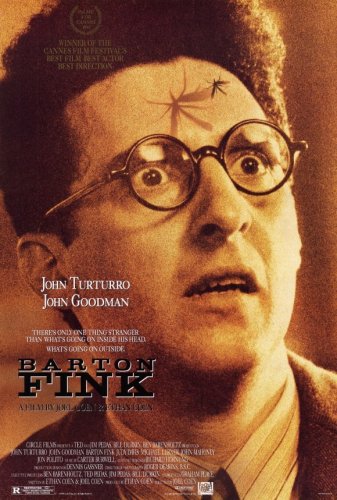| Date | Area | Gross |
|---|---|---|
| USA | USD 6,153,939 | |
| UK | GBP 679,517 | |
| Australia | AUD 392,283 | |
| Germany | USD 1,300,000 | |
| 1992 | Hong Kong | HKD 106,000 |
| Spain | ESP 93,570,000 |
| Date | Area | Gross | Screens |
|---|---|---|---|
| 23 August 1991 | USA | USD 268,561 | 11 |

The hand that Chet uses to stop the bell ringing.
The corpses of Detectives Mastrionotti and Deutsch disappear from the hallway when Barton walks out of his room after talking with Mundt.
Charlie's leaking ear changes sides.
'Tony Shalhoub' (qv)'s name is spelt Tony Shaloub in the opening credits.
When Mundt comes out of the elevator, the two detectives have just come out of Barton's room, and only a little way down the corridor.
Mundt chases the second cop a good way down the corridor, but when he walks up to the fallen cop, he's still only at the door to Barton's room - we can see him walk past the door from Barton's POV.
After Barton tacks up the first strip of wallpaper, he smoothes out the second strip and, in close-up, we see that the first thumbtack is not there.
When Mundt pulls the bedframe apart, the metal ball that drops to the floor has a metal rod through the center.
When it hits the floor, the rod is nowhere to be seen.
In one of the final shots of Colonel Lipnick in uniform, the bottom two rows of his ribbons have come lose and are hanging from one side.
In the last shot, his ribbons have been fixed.
When Mundt is racing towards the cops followed by fire, the flames can be seen following lines of flammable material sprayed on the walls.
When Barton meets Charlie for the first time, the fan behind him on the desk changes speeds.
The strips attached to the fan are first slack, then blowing out, then slack again.
Approximately 22 minutes into the movie a red light flashes on Barton's left ear just after he finishes the line, "And what's your line, Mr.
Meadows?" Colonel Lipnick's uniform contains awards created after 1941, including a Master Parachutist Badge (1949) and the Combat Infantryman's Badge (1943).
Felix |
| Best Actor |
| Best Art Direction |
| Best Cinematography |
| Best Costume Design |
| Best Director |
| Best Film Editing |
| Best Original Screenplay |
| Best Picture |
| Best Sound Design |
| Best Supporting Actor |
ACCA |
| Best Actor in a Leading Role |
| Best Actor in a Supporting Role |
| Best Cinematography |
| Best Costume Design |
| Best Original Screenplay |
| Best Production Design |
Top 10 Film Award |
| Best Film |
Palme d'Or |
CFCA Award |
| Best Actor |
| Best Cinematography |
| Best Director |
| Best Picture |
| Best Screenplay |
| Best Supporting Actor |
DFWFCA Award |
| Best Picture |
| Best Supporting Actor |
David |
| Best Foreign Actor (Migliore Attore Straniero) |
Golden Train Award |
| Best Film |
Silver Ribbon |
| Best Foreign Director (Regista del Miglior Film Straniero) |
ALFS Award |
| Actress of the Year |
| British Technical Achievement of the Year |
LAFCA Award |
| Best Cinematography |
| Best Supporting Actor |
NYFCC Award |
| Best Cinematographer |
| Best Supporting Actor |
| Best Supporting Actress |
Bronze Horse |
| Date | Area | Gross |
|---|---|---|
| USA | USD 6,153,939 | |
| UK | GBP 679,517 | |
| Australia | AUD 392,283 | |
| Germany | USD 1,300,000 | |
| 1992 | Hong Kong | HKD 106,000 |
| Spain | ESP 93,570,000 |
| Date | Area | Gross | Screens |
|---|---|---|---|
| 23 August 1991 | USA | USD 268,561 | 11 |
Torturro, Coen Brothers and John Goodman. Story of intellectual that goes to Hollywood to sell-out and a lot of crazy stuff happens to him, he is in this lousy hotel.
To bear one's soul on the page and for it to go unappreciated must be hellish. Poor Barton.
This is a great critique of pomposity. In "Barton Fink", the Coens mock the faux-populism of the eponymous character (John Turturro).
Well... um...
John Turturro is Barton Fink, an established playwright who just signed what seems to be his masterpiece: a story about fishmongers. As the play concludes, Fink, standing in the backstage, recites the last lines, riveted by the greatness of his own words.
I've only read the first page of the reviews posted here on IMDb but I'm still astonished that none of those makes the connection - crystal clear imo - of Fink/Clifford Odets and Mayhew/William Faulkner which leads me to the conclusion that to a man those reviewers on the first page are either 1) too young to have first hand knowledge of American Literature in the thirties and forties or 2) too ignorant of the same subject in the same time-frame. Fact: Clifford Odets wrote a One-Act Play, Waiting For Lefty, about a strike amongst taxi-drivers in 1930s New York.
There are three elements which are present in almost all the Coen's films: The heavy loaded drama,a couple thriller elements and the dark comedy. All their films has these three elements, the only difference being the amount of each one of these aspects are used in them.
This product is a lesson of cinema. And the lessons of cinema are not for everybody.
I highly recommend to watch this movie for the people who love analyzing movies. You could take this film for a fictional story or a take it for a deeper look and theorize that ir represents the writers of this movie itself.